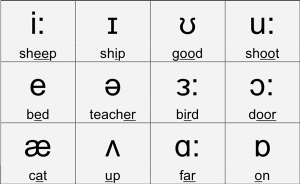Asst. Prof. Tsvetanka Chernogorova
Seminars: 15 hours
ECTS credits: 1
 This course is designed to help students improve their pronunciation by giving them enough practice in the production and perception of the sounds of English, drawing their attention to individual sounds and groups of sounds which pose problems for Bulgarian learners of English as a foreign language. Students are introduced to some basic concepts in phonetics and phonology which enable them to describe speech sounds and discuss their pronunciation and perception. At the beginning of the course students are familiarised with the phonemic alphabet and taught how to transcribe words and short sentences. Throughout the course they regularly do transcription exercises from dictation and written texts which help them develop and hone their skills of writing and reading the phonemic script. The rest of the course focuses on connected speech processes and how they affect and change the pronunciation of individual words and phrases in the sentence, considers words and groups of words with problematic lexical stress, and introduces the most common rhythm and intonation patterns in English. The most important differences between British and American pronunciation models are also discussed.
This course is designed to help students improve their pronunciation by giving them enough practice in the production and perception of the sounds of English, drawing their attention to individual sounds and groups of sounds which pose problems for Bulgarian learners of English as a foreign language. Students are introduced to some basic concepts in phonetics and phonology which enable them to describe speech sounds and discuss their pronunciation and perception. At the beginning of the course students are familiarised with the phonemic alphabet and taught how to transcribe words and short sentences. Throughout the course they regularly do transcription exercises from dictation and written texts which help them develop and hone their skills of writing and reading the phonemic script. The rest of the course focuses on connected speech processes and how they affect and change the pronunciation of individual words and phrases in the sentence, considers words and groups of words with problematic lexical stress, and introduces the most common rhythm and intonation patterns in English. The most important differences between British and American pronunciation models are also discussed.
COURSE OBJECTIVES AND LEARNING OUTCOMES
By the end of the course students are expected to:
- Know basic terms and concepts used in the description and classification of speech sounds, and be able to describe and classify the English vowels and consonants
- Be aware of the articulatory settings and the most important differences between the pronunciation of the speech sounds of the standard varieties of English and Bulgarian
- Have knowledge of some basic allophones such as aspirated plosives, clear and dark /l/
- Know and apply the letter-to-sound rules in transcription
- Learn the basic morphophonemic alternations (the pronunciation of –s and –ed)
- Transcribe phonemically words and connected speech applying the processes of assimilation, elision, epenthesis, linking and intrusive ‘r’ and their knowledge of weak forms and word stress
ASSESSMENT
The final grade is based on continuous assessment which includes
- Seminar attendance (70% attendance) and participation in class discussions (20%)
- Home assignments (20%)
- In-class quizzes (10%)
- A mid-term test and a final test (50%)
SYLLABUS
1. Introduction.
2. Some basic essentials. Articulatory settings
3. IPA symbols, phonetic and phonemic transcription.
4. English and Bulgarian vowels.
5. Diphthongs.
6. Weak vowels.
7. English stops. Plosives and Affricates.
8. Fricatives.
9. Approximants. Nasals and laterals.
10. Syllabic consonants.
11. Inflections.
12. General British and General American.
13. Choice of pronunciation model. Diagnostic work.
14. Connected speech. Strong, weak and contracted forms.
15. Connected speech. Assimilation, elision, epenthesis, liaison.
16. Word stress and rhythm.
17. Transcription of connected speech.
18. Bulgarian speakers’ problems. Error analysis.
REFERENCES
Core reading
Dimitrova, S. 2003. English Pronunciation for Bulgarians. Sofia: Vezni – 4.
Lecumberri, L. M. and J. A. Maidment. 2000. English Transcription Course. London: Arnold.
Roach, P. J. 2000. English Phonetics and Phonology. A practical course. 4th edn. Cambridge: Cambridge University Press (or earlier editions)
Schmitt, H. 2011. Phonetic transcription. Berlin: Eric Schmidt Verlag
Tench, P. 2011. Transcribing the sound of English. Cambridge: Cambridge University Press
Further reading
Collins, B. and I. Mees. 2013. Practical Phonetics and Phonology. A resource book for students 3rd edn. London and New York: Routledge.
Gimson, A. C. and A. Cruttenden. 2014. Gimson’s Pronunciation of English. Revised by A. Cruttenden. 8th edn. Hodder Education.
Pronunciation dictionaries
Jones, D. 2011. Cambridge English Pronouncing Dictionary. 18th edn. (or the earlier – 16th edn, 2003) Ed. by P. Roach. J. Hartman and J. Setter. Cambridge: CUP.
Wells, J. C. 2008. Longman Pronunciation Dictionary. 3rd edn. London: Pearson Longman.
Wells, J. C. 2008. Longman Pronunciation Dictionary. 3rd edn. London: Pearson Longman.